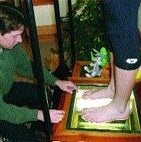Training Center: Can orthotics help my sore back?

Orthotic inserts can improve support and alignment of the foot and lower leg, the benefits of which can extend to the lower back. Photo courtesy BCSM
Have a question for VeloNews Training Center?
Send it to TrainingCenter@competitorgroup.com
Orthotics for lower back pain
Dear VeloNews Training Center,
What is the story with orthotics? I’ve heard people rave about them and have heard others who saw no improvement. I’m prone to some lower back pain on long rides, should I consider custom orthotics or are there commercially available ones that do the same thing? What kinds of symptoms might be alleviated by custom orthotics?
Thanks,
— James
James,
The usefulness of orthotics depends on the way in which a person’s body functions and moves while cycling. Cyclists that experience excessive collapse of the foot can also experience subsequent misalignment of the leg and, in some cases, the pelvis/low back. Common injuries resulting from this malalignment include Morton’s neuroma (numbness or a hot, painful sensation under the forefoot), patellofemoral pain, iliotibial band irritation, and sometimes pelvic/low back pain. In these cases, improving alignment with an orthotic can reduce the inappropriate load to the painful joints or soft tissue. Orthotics primarily work in two ways:
• Support the structures of the foot to prevent excessive collapse
• Directly improve alignment of the bones/joints with canting to prevent inward rotation and angulation. Cycling shoes are connected to the pedal at the forefoot and thus may require canting or support at this juncture.
Not everyone will see improvement with use of orthotics because alignment problems exist beyond the foot. The marriage between bike and body involves many mechanical and physical characteristics that require thorough evaluation. Evaluation can examine attributes intrinsic to the rider like muscular flexibility, joint mobility, strength, movement control, and inherent structural alignment and extrinsic factors such as frame size, stem length and angle, saddle height, saddle fore/aft, and cleat position. Failure to address both body and bike can result in injury potential, limited performance, and compromise of overall riding enjoyment.
Whether your low back pain could improve with use of orthotics depends on all the aforementioned considerations. That having been said — if your foot collapses, your knees move inward toward the top tube, and your low back is bothered by extension, you could potentially benefit from orthotics. The orthotics would work to help prevent the lower leg from angulating inward by decreasing the extent to which the foot collapses. Decreasing the inward angulation or valgus of the knee may help to limit an inappropriate forward rocking of the pelvis and thus decrease the relative extension occurring at the junction between pelvis and lumbar spine.
Over-the-counter products do exist and depending on the manufacturer, they may address the longitudinal and/or transverse arch as well as the forefoot. Some arch supports provide canting for the forefoot via an in-shoe wedge. The foot may also be supported by canting between the shoe and the pedal if needed. A competent bike fitter, preferably one that has medical training, can help you decide which, if any is best for you. For those with significant or complicated alignment issues, custom orthotics provide optimal support and correction.
So if your bike-body relationship needs an intervention, know that many tools, including orthotics, exist to strengthen it. A proper evaluation by a trained professional is step number one.
Good luck!
— Tim
Tim Hilden, PT, ATC, is a senior physical therapist and certified athletic trainer at BCSM, who specializes in gait analysis and orthotics, as well as orthopedic foot issues.
Boulder Center for Sports Medicine was founded by Andrew Pruitt, EdD, PA-C, in 1998. For the past 12 years BCSM has been providing athletes from around the world with the highest possible level of care. BCSM offers a wide range of services, including Orthopedic Clinics, Physical Therapy, Expert 3D Bike Fitting, Running Gait Analysis, Coaching & Training, Nutrition Services, Performance Testing, and more. For more information, visit www.bch.org/sportsmedicine, or call (303) 544-5700.